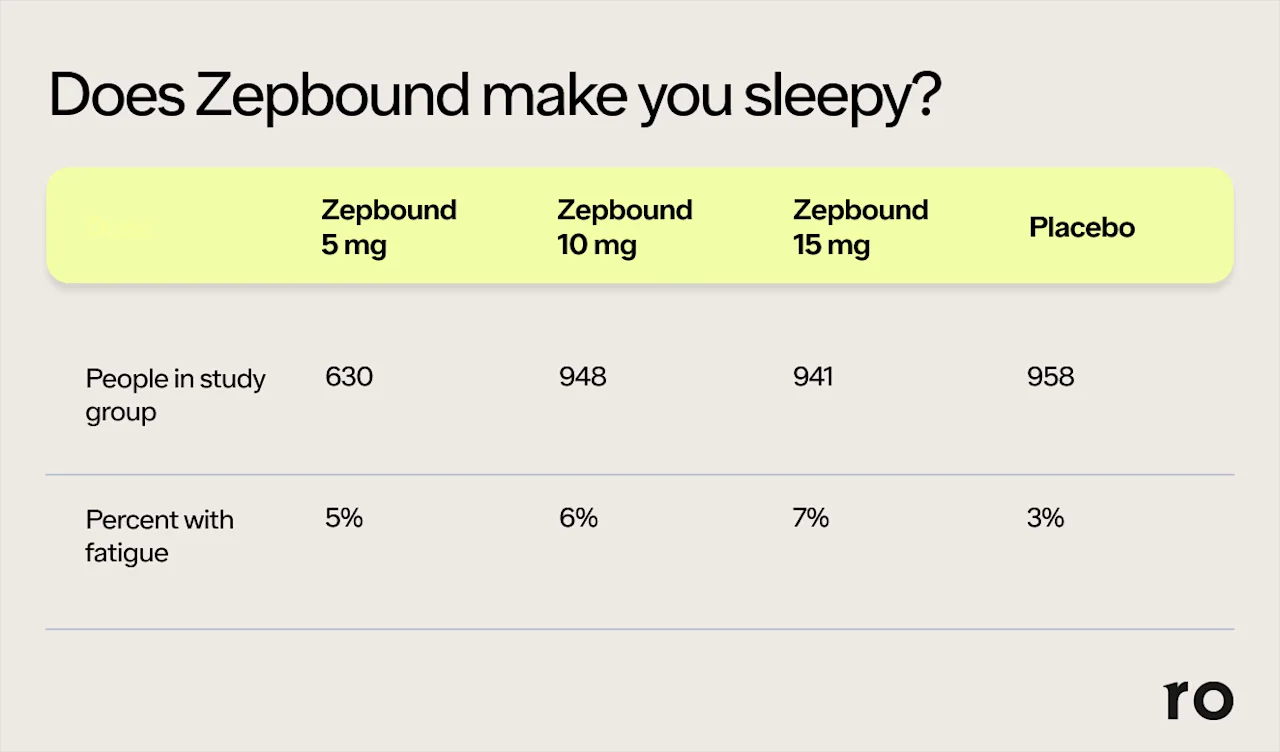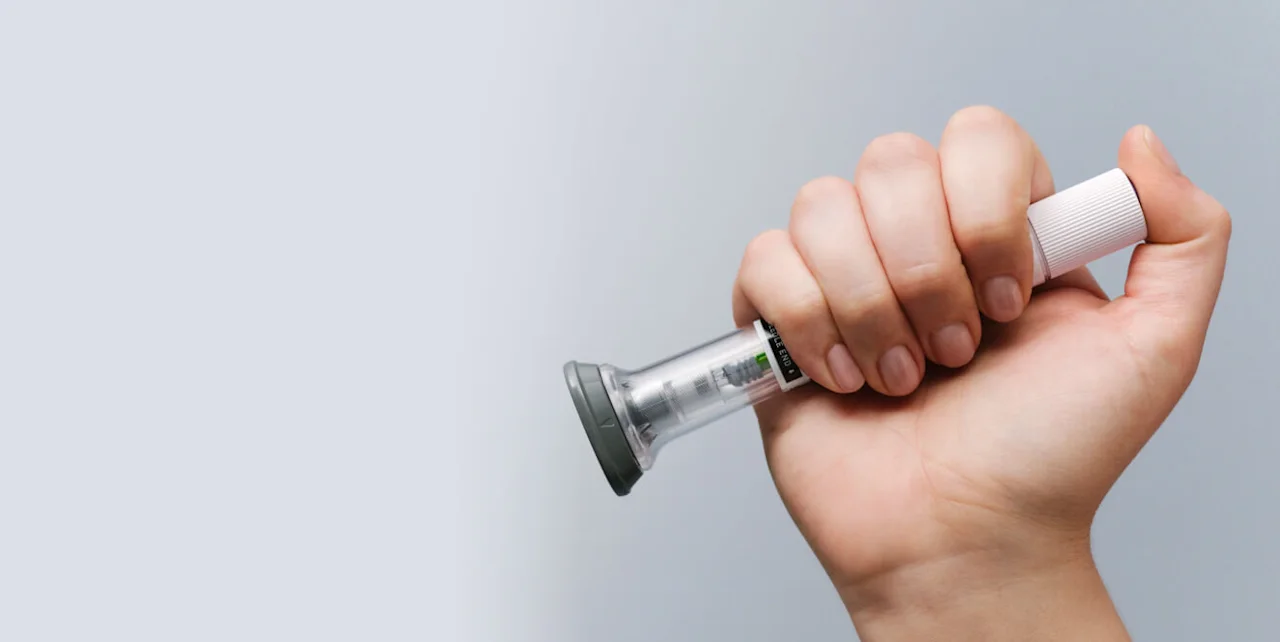Key takeaways
Fatigue is one of the more common side effects of Zepbound after gastrointestinal side effects and injection site reactions.
Zepbound can make you feel tired because it lowers your appetite, which decreases your calorie (energy) intake. It also commonly causes vomiting and diarrhea, which can increase your risk of dehydration.
Zepbound fatigue is usually temporary and goes away as your body adjusts to the medication. This can take a few weeks.
Ways to boost your energy levels while taking Zepbound include practicing good sleep habits, exercising regularly, staying hydrated, and eating balanced meals.
Here's what we'll cover
Here's what we'll cover
Here's what we'll cover
Key takeaways
Fatigue is one of the more common side effects of Zepbound after gastrointestinal side effects and injection site reactions.
Zepbound can make you feel tired because it lowers your appetite, which decreases your calorie (energy) intake. It also commonly causes vomiting and diarrhea, which can increase your risk of dehydration.
Zepbound fatigue is usually temporary and goes away as your body adjusts to the medication. This can take a few weeks.
Ways to boost your energy levels while taking Zepbound include practicing good sleep habits, exercising regularly, staying hydrated, and eating balanced meals.
Experiencing Zepbound fatigue? You’re not alone. While it’s a lesser-known side effect of the GLP-1 medication, feeling sleepy on Zepbound is actually quite common.
But why does Zepbound make you tired? And what can you do to manage it? In this article, we answer these questions and cover what you need to know about Zepbound and sleepiness.
Does Zepbound make you sleepy?
Yes, Zepbound (tirzepatide) can make you sleepy. In fact, Zepbound’s prescribing information lists fatigue as one of the drug’s most common side effects after, of course, gastrointestinal (GI) ones like nausea and diarrhea, and injection site reactions.
In clinical trials, 5% of people taking 5 mg of Zepbound, 6% of people taking 10 mg, and 7% of people taking 15 mg reported fatigue. In comparison, only 3% of those taking a placebo experienced this side effect.

Now, this doesn’t necessarily mean you’ll experience fatigue if you take Zepbound, but it’s possible.
Why does Zepbound make you sleepy?
It’s not fully understood why Zepbound can make you tired. But it may be linked to the drug’s effects on your appetite and its other potential side effects. Let’s take a closer look.
Reduction in appetite
Zepbound mimics two natural hormones — GIP and GLP-1 — that regulate blood sugar and hunger. It increases insulin release, decreases glucose (sugar) production, and delays gastric emptying (aka how quickly food moves through your digestive system).
As a result, you feel fuller sooner and for longer, leading you to eat less and lose weight. A 2023 study found that within eight weeks of starting Zepbound, people consumed nearly 200 fewer calories during lunch than before treatment.
But significantly reducing your appetite and, in turn, calorie intake can make you feel fatigued. It’s simple, really: Calories provide energy for your body to function. So, the fewer calories you consume, the lower your energy levels will likely be.
Gastrointestinal side effects
GLP-1 medications, like Zepbound, are notorious for causing GI side effects. Common examples include nausea, diarrhea, and vomiting. Unfortunately, many of these GI side effects can cause your body to lose fluids, which can result in dehydration.
And dehydration can lead to fatigue, reduced alertness, and increased sleepiness, which is one reason why Zepbound can make you tired. The good news is these side effects usually go away as your body adjusts to the medication over the first few weeks.
In some cases, GI side effects can also disrupt sleep. Frequently waking up to use the bathroom or tossing and turning due to an uneasy stomach doesn’t exactly make for restful shut-eye. This can lead to or worsen daytime fatigue.
Low blood sugar
The active ingredient in Zepbound, tirzepatide, has blood-sugar-lowering effects. In fact, Mounjaro, which also contains tirzepatide, is approved by the US Food and Drug Administration (FDA) to reduce blood sugar levels in people with type 2 diabetes.
While Zepbound isn’t approved for this purpose, it can still bring down blood sugar levels. Having lower blood sugar can make you feel tired, especially as your body adjusts.
While it’s rare, Zepbound may also cause hypoglycemia (low blood sugar levels), especially if you’re taking it with insulin or other medications that lower your blood sugar. Hypoglycemia can cause symptoms like confusion, dizziness, and fatigue.
Increased physical activity
Zepbound is approved alongside a reduced-calorie diet and increased physical activity. So, if you’re taking the medication as prescribed, you’re likely eating fewer calories each day and spending more time breaking a sweat. Unfortunately, however, both of these lifestyle changes can contribute to Zepbound fatigue.
When you exercise more than your body is used to, your muscles require additional energy to recover and rebuild. This extra demand can leave you feeling more tired than usual, especially when paired with a lower calorie intake.
How long does Zepbound fatigue last?
It varies. Every person responds differently to medication, so there isn’t a standard time for how long Zepbound fatigue lasts. In general, Zepbound side effects are typically temporary and tend to go away over time as your body gets used to the medication. This usually occurs over the course of a few weeks.
How can you improve Zepbound fatigue?
Although Zepbound fatigue is usually temporary, there are a few things you can do to try to boost your energy.
Practice good sleep habits
Poor sleep can reduce your energy levels. If you’re feeling sleepy, try to aim for 7-9 hours of sleep per night. Prioritizing good sleep hygiene habits can also help. Examples include:
Adopt a consistent sleep schedule
Limit caffeine intake
Keep the room dark and avoid bright lights and screens
Exercise regularly
Exercise regularly
While it might be counterintuitive to think that exercise can help boost your energy, research has shown that exercise and physical activity can help reduce fatigue in adults with chronic conditions. There is also evidence that regular exercise can reduce fatigue and improve energy levels.
To get started, try incorporating at least 20-30 minutes of low-to-moderate intensity exercise a few times per week, such as walking or biking.
Stay hydrated
Remember how dehydration can lead to fatigue and increased sleepiness? Staying hydrated can help counteract these effects.
So make sure you’re drinking enough water throughout the day, as this can help prevent fatigue and maintain your energy levels. While the exact amount of H2O recommended varies depending on the person, experts usually recommend about 9-13 cups of water daily.
Eat a balanced diet
Like we mentioned earlier, food (by way of calories!) provides your body with energy. So, it is a good idea to consume healthy, nutritious foods so your body has what it needs to function properly. Think lean proteins, whole grains, and high-quality fats. Some research has shown that the Mediterranean diet can help improve people’s sleep quality.
If you’re having GI side effects, you may want to stick to a bland diet that includes foods like bananas, toast, oatmeal, and white rice. These items are usually easier to tolerate and can even help improve GI symptoms. Eating more frequent, smaller meals may also help with feeling sleepy on tirzepatide — Zepbound included.
Talk to your healthcare provider
If you’ve tried the strategies above and your fatigue doesn’t seem to be improving, it is a good idea to check in with your healthcare provider. They may recommend other ways to manage your sleepiness, order tests to see if there may be another cause, or adjust your dosage to help your body adjust to the drug.
Bottom line
If you’ve been taking Zepbound and have been feeling sleepy, you might be wondering, “can Zepbound make you tired?” The short answer is yes, it can. Here are some key points to remember if you’re feeling tired while taking Zepbound:
Zepbound fatigue is relatively common. In studies, up to 7% of people taking Zepbound reported fatigue. But, in most cases, this side effect is temporary and will go away as your body gets used to the medication. This usually occurs over the course of a few weeks.
It’s not fully clear why Zepbound causes fatigue. It is likely due to the drug lowering your appetite, which can reduce your calorie (read: energy) intake. Fatigue may also occur as a result of the drug’s other side effects, like nausea, vomiting, and low blood sugar.
If you’re feeling sleepy while on Zepbound, there are a few things that can help increase your energy. These include getting quality sleep, exercising regularly, staying hydrated, and eating a balanced diet.
Frequently asked questions (FAQs)
Can Zepbound cause fatigue?
Yes, fatigue is one of the most common side effects of Zepbound after GI side effects. Up to 7% of people in studies reported fatigue while taking the drug.
When to take Zepbound: morning or night?
Zepbound can be taken at any time of day, morning or night, with or without meals. It should be injected once weekly, on the same day each week. If you need to change the day of the week you take your dose, make sure the time between two doses is at least three days. Learn more with our guide to injecting Zepbound.
DISCLAIMER
If you have any medical questions or concerns, please talk to your healthcare provider. The articles on Health Guide are underpinned by peer-reviewed research and information drawn from medical societies and governmental agencies. However, they are not a substitute for professional medical advice, diagnosis, or treatment.
Zepbound Important Safety Information: Read more about serious warnings and safety info.
GLP-1 Important Safety Information: Read more about serious warnings and safety info.
Mounjaro Important Safety Information: Read more about serious warnings and safety info.
References
Barakou, I., Sakalidis, K. E., Abonie, U. S., et al. (2023). Effectiveness of physical activity interventions on reducing perceived fatigue among adults with chronic conditions: a systematic review and meta-analysis of randomised controlled trials. Scientific Reports, 13(1), 14582. doi: 10.1038/s41598-023-41075-8. Retrieved from https://pmc.ncbi.nlm.nih.gov/articles/PMC10477297/
Basso, J. C. & Suzuki, W. A. (2017). The Effects of Acute Exercise on Mood, Cognition, Neurophysiology, and Neurochemical Pathways: A Review. Brain Plasticity (Amsterdam, Netherlands), 2(2), 127–152. doi: 10.3233/BPL-160040. Retrieved from https://pmc.ncbi.nlm.nih.gov/articles/PMC5928534/
Buğday, B., Çelik, A. L., Safran, E. E., & Şevgin, Ö. (2025). Impact of resistance exercise and diet on physical activity, sleep, and fatigue in obese individuals: a randomized controlled trial. BMC Public Health, 25(1), 2282. doi: 10.1186/s12889-025-23549-8. Retrieved from https://bmcpublichealth.biomedcentral.com/articles/10.1186/s12889-025-23549-8
Castro-Diehl, C., Wood, A. C., Redline, S., et al. (2018). Mediterranean diet pattern and sleep duration and insomnia symptoms in the Multi-Ethnic Study of Atherosclerosis. Sleep, 41(11), zsy158. doi: 10.1093/sleep/zsy158. Retrieved from https://pmc.ncbi.nlm.nih.gov/articles/PMC6231522/
Chaput, J. P., Dutil, C., & Sampasa-Kanyinga, H. (2018). Sleeping hours: what is the ideal number and how does age impact this?. Nature and Science of Sleep, 10, 421–430. doi: 10.2147/NSS.S163071. Retrieved from https://pmc.ncbi.nlm.nih.gov/articles/PMC6267703/
Farzam, K. & Patel, P. (2024). Tirzepatide. StatPearls. Retrieved from https://www.ncbi.nlm.nih.gov/books/NBK585056/
Gorgojo-Martínez, J. J., Mezquita-Raya, P., Carretero-Gómez, J., et al. (2022). Clinical Recommendations to Manage Gastrointestinal Adverse Events in Patients Treated with Glp-1 Receptor Agonists: A Multidisciplinary Expert Consensus. Journal of Clinical Medicine, 12(1), 145. doi: 10.3390/jcm12010145. Retrieved from https://pmc.ncbi.nlm.nih.gov/articles/PMC9821052/
Heise, T., DeVries, J. H., Urva, S., et al. (2023). Tirzepatide Reduces Appetite, Energy Intake, and Fat Mass in People With Type 2 Diabetes. Diabetes Care, 46(5), 998–1004. doi: 10.2337/dc22-1710. Retrieved from https://pmc.ncbi.nlm.nih.gov/articles/PMC10154650/
Liska, D., Mah, E., Brisbois, T., et al. (2019). Narrative Review of Hydration and Selected Health Outcomes in the General Population. Nutrients, 11(1), 70. doi: 10.3390/nu11010070. Retrieved from https://pmc.ncbi.nlm.nih.gov/articles/PMC6356561/
Taylor, K. & Tripathi, A.K. (2025). Adult Dehydration. StatPearls. Retrieved from https://www.ncbi.nlm.nih.gov/books/NBK555956/
U.S. Food and Drug Administration (FDA-a). (2025). Mounjaro (tirzepatide) injection, for subcutaneous use: Full prescribing information. Retrieved from https://www.accessdata.fda.gov/drugsatfda_docs/label/2025/215866s031lbl.pdf
U.S. Food and Drug Administration (FDA-b). (2025). Zepbound (tirzepatide) injection, for subcutaneous use: Full prescribing information. Retrieved from https://www.accessdata.fda.gov/drugsatfda_docs/label/2025/217806Orig1s020lbl.pdf
Wadden, T. A., Chao, A. M., Moore, M., et al. (2023). The Role of Lifestyle Modification with Second-Generation Anti-obesity Medications: Comparisons, Questions, and Clinical Opportunities. Current Obesity Reports, 12(4), 453–473. doi: 10.1007/s13679-023-00534-z. Retrieved from https://pmc.ncbi.nlm.nih.gov/articles/PMC10748770/













